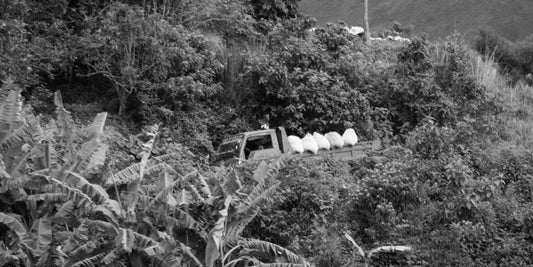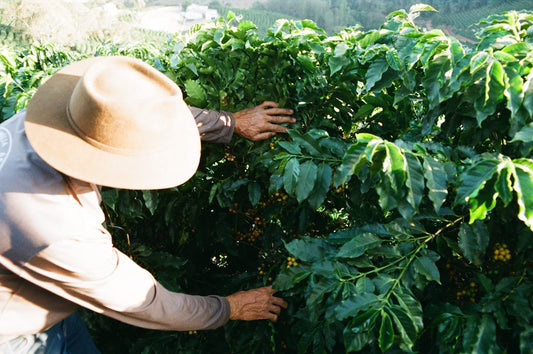
Around the World in Coffee Part 3: Kenya
So far – we’ve seen the sights of coffee being grown in both Brazil and Colombia (from our computer screens obvz). This week, it’s all about Kenya.
I think it’s becoming clear that every time we start one of these blogs, whatever coffee producing country we’re talking about – suddenly becomes our favourite. If you didn’t know already, we really love coffee. This blog series has made us realise that we love the coffees produced by each country for different reasons! We don’t really have a favourite, because the flavour in the cup is so diverse from origin to origin. Saying that, Kenya is our favourite. If someone held a gun to our head and said “you can only drink coffee from one country for the rest of your life”, we’d choose Kenya.
So, African then. There’s tonnes to discover and that’s just in Kenya alone – let’s get amongst it.
We’re going to start with talking about Ethiopia (plot twist). Don’t worry, it will all make sense shortly. Kenya rubs shoulders with Ethiopia – which is considered the birthplace of coffee. The first documented coffee export in Ethiopia was in the 1600s, so it’s pretty surprising that the first documented coffee import in Kenya wasn’t until 1893 and the first crop was harvested in 1896. That’s a solid 250+ year lag! We’ll never really know why (it might have something to do with the fact that Instagram didn’t exist in those days), but it’s a pretty interesting fact nonetheless. What we do know is that coffee only arrived in Kenya, when the French missionaries got hold of it. So it’s likely (but not confirmed) that it made its way across the Indian Ocean, from the island of Bourbon.
HISTORY OF COFFEE IN KENYA
Historically, Kenya has had issues with coffee berry disease (CBD) and coffee leaf rust. In 1968, CBD ravaged 50% of the country’s crop and created a crisis for the farmers growing coffee in Kenya. A lot of work has since been done to try and mitigate these risks and new hybrid varieties have been developed to be disease resistant. Not only have they been developed for disease resistance, but to increase yield, whilst retaining the same revered cup quality that Kenyan coffee is renowned for.
The two dominant varieties in Kenya are SL-28 and SL-34. The “SL” in these two varieties stands for “Scott Laboratories”. The naming convention for coffee varieties is pretty unpredictable, but you’ll usually find there is a story behind each name. Scott Labs developed these two varieties as part of a research contract between 1934 and 1963 in order to improve yields and disease resistance. Recent genetic tests have confirmed that SL-28 is related to the Bourbon genetic group. Bourbon is the mothership cultivar from which all coffee varieties are derived (so we’re not just talking about biscuits). If you’ve had a coffee from Kenya, the chances are it would have been an SL variety, which is almost synonymous with the quintessential sparkling quality of Kenyan coffee.
In 1985, the new variety “Ruiru 11” was put into circulation across Kenya, in the hope it would replace the SL-28 & SL-34 varieties. This was a compact, high yielding variety, that was suited to intensive production, with defence against diseases. However, Ruiru 11 didn’t quite cut the mustard for Kenyan coffee lovers. It might have been good for disease resistance, but the cup quality just wasn’t quite there.
This led to the creation of Batian (named after the highest peak on Mt. Kenya) which was released in 2010, but the uptake amongst farmers has been slow after Ruiri 11 didn’t live up to expectations. There has been a large marketing campaign to get Batian into the farms in Kenya, showing a significant increase in uptake. Unlike Ruiru 11, Batian is a tall tree with a large vegetative growth, which requires specific pruning methods and regular handling – to keep it at the peak of production. Training on growing this variety will be a significant component of the plant’s success.
Coffee in Kenya is grown on both large scale farms and smallholdings, who typically send their coffee to the local washing stations for processing. The coffee is then sold at the Nairobi Coffee Exchange via a weekly government-run auction system. This system was brought into place after Kenya gained independence from the British in 1963 and is still in place today. This way of selling green coffee beans is unique to anywhere else in the world and is problematic for two reasons. Firstly, it is very difficult to develop relationships with farmers in Kenya, meaning that it’s even more difficult to buy the same coffees year on year (this is mostly due to the green coffee being sold to the highest bidder, to fetch the best possible price). Secondly – any fluctuation in pricing is at the mercy of the auction and whoever is prepared to increase their bid on the day. This makes things quite volatile for both sellers and buyers.
Things are slowly changing in Kenya and with more importers/exporters realising the importance of traceability – it is becoming easier to trace Kenyan coffees back to, even the smallest of farms. This level of traceability is ubiquitous across the rest of the coffee industry (generally speaking) as coffee lovers now want to know as much as possible about where their coffee has come from and the story behind it.
Kenya benefits from rich volcanic soil found in the highlands of the country, with some of the highest quality coffees grown in Nyeri, a town situated in the Central Highlands of Kenya. There are some other pretty interesting growing regions across Kenya but one thing they all have in common is that a lot of the coffee is grown in rich volcanic soil.
WHAT DO KENYAN COFFEES TYPICALLY TASTE LIKE?
There was a time not too long ago when everyone in the specialty coffee game was going absolutely wild for Kenyan coffees, but in recent years other, more experimental origins (such as Colombia) have stolen the limelight. In our minds though, you just can’t beat that sweet, juicy, bright acidity and big blackcurrant vibes, you get from a really high-quality Kenyan!
So, if you’ve fallen out of love with Kenyan coffees and are currently infatuated with double-anaerobic-thermal-shock-washed-natural-twiglet-fest, we’ve got a sweet 10% discount on our Kenya coffee, so you can revel in the comfort of a good old fashioned washed coffee again! If you’ve not yet ventured into bright and floral coffee territory, now is your chance. You won’t regret it.
Enter the code LOVEKENYA to get 10% off your order! Offer valid until 23:59 on Sunday 18th July 2021. Code is single use only and cannot be used in conjunction with other offers.




